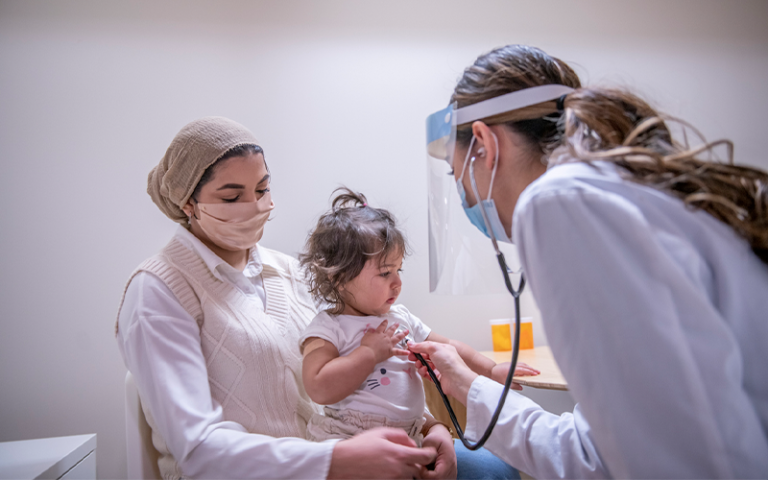Monitoring migrant access to universal healthcare
Rachel Burns (UCL Institute of Health Informatics) used UCL RIGE funding to help improve data collection about migrant access to healthcare, to support the UN Sustainable Development Goals.

23 August 2023
All 191 United Nations Member States have signed the UN Sustainable Development Goals (SDGs), which have the aim of ending poverty and pursuing a sustainable future by 2030. SDG 3 aims to achieve universal health coverage, yet many countries are falling short of achieving this goal. The reasons for this are complex and varied, but one is the lack of provision and lack of data for undocumented migrants and other marginalised groups who need to access healthcare services.
In response to this, Rachel Burns from the UCL Institute of Health Informatics partnered with Anna Miller from Doctors of the World / Médecins du Monde (MdM) United Kingdom. The two teams had an existing relationship, with the UCL Institute of Health Informatics working with MdM on their biannual European observatory report. Both parties wanted to build on this relationship to improve data collection, at a time when MdM is expanding its data analysis from only covering Europe, to going global.
Providing the foundations to provide better healthcare access
“MdM works with a really marginalised population, offering free health clinics through programmes in each of the countries it works in,” Rachel explained. “They support mostly undocumented migrants, and also people who are experiencing homelessness, and other socially excluded groups. But it's really hard to bring together the data about this from various different countries, because it's collected so differently.”
This was the starting point for this project. If the team can identify missing data and collect data in a uniform way, it will help MdM with their advocacy goals. The funding has been used to send a survey to all MdM chapters to understand more about their data priorities. There will also be a two-day workshop to bring together individuals representing different chapters of MdM from across the world. They will discuss the issues they’re facing and consider how data quality can be improved.
In addition to this, the project is also bringing in people with lived experience. “The UK chapter of MdM does a lot of co-production work with people with lived experience, but this isn't something the other MdM chapters do,” Rachel explained. “We're hosting consultations to understand more about how people with lived experience in the UK have helped shape advocacy and research priorities. And then we’re going to recruit participants from each of the MdM chapters to think about priorities for the project and what's important from the perspective of people with lived experience.”
Migrants and other individuals who move locations are a diverse and generally underserved population, which adds complexity to this project. “Health systems are built within borders,” said Rachel. “When individuals move, geopolitics, human rights and ideas of entitlement come into play. Measuring this gap through the MdM patient population gives an idea of how well we’re serving the rest of our populations in terms of accessible and universal health care coverage too.”
Working towards universal healthcare
“This project is going to be helping several chapters of MdM, who in turn support thousands of individuals, many of them undocumented migrants,” Rachel said. “This is all about how their data can be used in the best way possible to advocate for their specific goals, which for most is universal health care coverage. Data can really be really powerful and this will help provide the tools for MdM to meet its advocacy objectives in a data driven way.”
Rachel also noticed how the specific expertise of UCL Institute of Health Informatics is helping to provide solid foundations to the project. “Our team here works a lot in co-production and working with people with lived experience,” Rachel said. “Priorities for advocacy research should be led by the people NGOs and other organisations are working with. So that feels like a really important and potentially long term impact of this project.”
The project has also helped nurture a pre-existing relationship between UCL and MdM. “NGO budgets are really precarious, and as an early-career researcher, there aren’t many options like this for gaining funding,” Rachel said. “This grant supports the intersection between the operational and the academic, and it allows partnerships to continue to grow. Being early on in my career, I’ve been grateful for the opportunity to lead a project like this and conceptualise it from start to finish.”
 Close
Close

